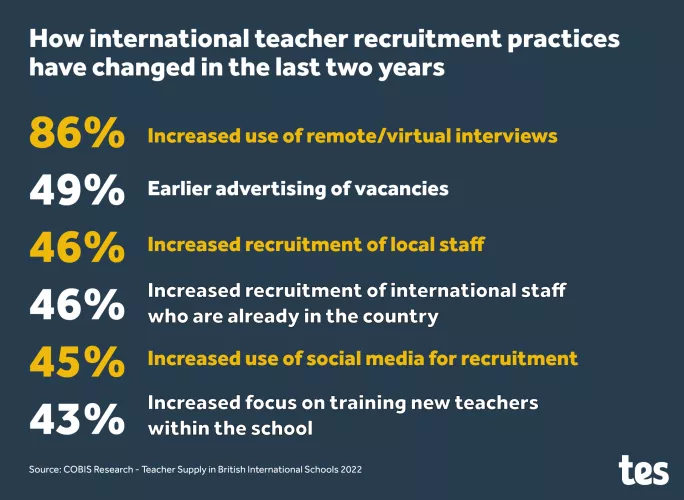- Home
- Analysis
- Specialist Sector
- How Covid-19 reshaped international hiring in schools
How Covid-19 reshaped international hiring in schools

Widespread use of virtual job interviews, increased recruitment of local staff and the practice of advertising jobs earlier than usual are just some of the ways international school leaders have adapted to the recruitment challenges caused by the pandemic.
These initiatives have been driven by the fact that more than 90 per cent of school leaders say they are finding it challenging to appoint the staff they want for new roles - and two-fifths of leaders say they are seeing a notable decline in applications for jobs being posted compared with before the pandemic.
These were some of the key findings from the latest Council of British International Schools (COBIS) Teacher Supply in British International Schools report - published today and seen exclusively by Tes - based on a global survey of more than 1,600 leaders and teachers in British international schools around the world.
Unsurprisingly, the majority of leaders in the report (68 per cent) said the pandemic was the direct cause of recruitment issues they are seeing - hence the need to innovate and try new recruitment tactics (see graphic below).

COBIS chief executive Colin Bell said these trends showed it was clear that international schools were “more than happy to transform their hiring practices in pursuit of securing the best staff” - and that virtual recruitment was an acceptable way to do this.
He noted, too, that it probably also helped with sustainability strategies by removing the environmental impact of face-to-face interviews. But he added a note of caution that, with virtual hiring on the rise, schools needed to ensure safe recruitment practices remained a strong as ever.
“Schools really must not be complacent and ensure they’re doing all the right references, checking background, following up with phone calls, and talking to those referees and going through any concerns that you might have,” he told Tes.
However, although international schools are innovating where they can on recruitment, there are still issues they cannot avoid when it comes to the impact of the pandemic on recruitment.
For example, 55 per cent of leaders reported that staff were often delayed in starting their job owing to travel restrictions, while 53 per cent said there were still delays and difficulties with visas and pre-employment checks.
In an effort to offset these issues, the COBIS survey found, many schools have made efforts to boost retention of current staff. These include boosting salaries (32 per cent) and benefits (27 per cent), improving appraisal systems (43 per cent) and boosting professional development (61 per cent).
Bell said this showed that “keeping colleagues engaged and motivated” was integral to a thriving school workforce and hence why, as in past COBIS reports, professional development scored higher than money or benefits.
“People want to feel recognised, and know that there’s an opportunity to develop their practice and to challenge themselves,” he said. “Good schools, good employers in education - in any sector - will help nurture that talent.”
However, the biggest area of focus for retention was around enhancing staff wellbeing initiatives, with 66 per cent of respondents citing this as their main area of focus. This is perhaps unsurprising, given that 94 per cent of leaders said they saw school closures and the need to teach remotely as having a significant or moderate negative impact on teacher wellbeing.
It is an area that Tes has explored with leaders from schools across the globe - as revealed in our Wellbeing Around the World series, which highlights numerous initiatives that have been brought in to improve this area of school life.
Bell said the COBIS report, and the initiatives showcased by Tes, underlined why wellbeing was a crucial area of school life, and a key aspect of recruitment and retention practices.
“Being in school is all about holistic health - so including the physical and the emotional - and no amount of strategies and policies that aren’t living and breathing staff wellbeing will achieve that,” he said.
“It’s all about the school culture and the environment that’s created, and I think international schools recognise that and are working to create that positive environment for staff - and where good leaders model good working practices in terms of self-care and appropriate work-life balance, too.”
However, while there are issues for schools and staff, there remains a generally positive view of working internationally, with 63 per cent of teachers feeling their workload is acceptable, 62 per cent stating they have a good work-life balance and 72 per cent being satisfied with their job overall.
Furthermore, many report that their time teaching overseas has enabled them to develop new skills, such as adaptability (69 per cent), resilience (61 per cent), greater cultural awareness (73 per cent) and experience working with students who have English as an additional language (46 per cent).
Despite this, the report said UK state and independent schools needed to develop a better understanding of the experience that international teachers gain and can bring back - as this can often be a hurdle for those wishing to return.
Bell said this was an area that COBIS continued to raise awareness of through government channels. He added that he hoped more UK leaders would continue to recognise how many skills international teachers could bring to their settings.
“A lot of teachers in British schools overseas, they had to shift to online learning, and transformation with virtual and technology, quicker and for longer periods of time than many schools in the UK,” he noted.
“They’ve got great stories to tell, these teachers, about how they’ve managed to change and manage things really smoothly - and that’s just another key attribute that teachers from our sector can demonstrate.”
You need a Tes subscription to read this article
Subscribe now to read this article and get other subscriber-only content:
- Unlimited access to all Tes magazine content
- Exclusive subscriber-only stories
- Award-winning email newsletters
Already a subscriber? Log in
You need a subscription to read this article
Subscribe now to read this article and get other subscriber-only content, including:
- Unlimited access to all Tes magazine content
- Exclusive subscriber-only stories
- Award-winning email newsletters
topics in this article



